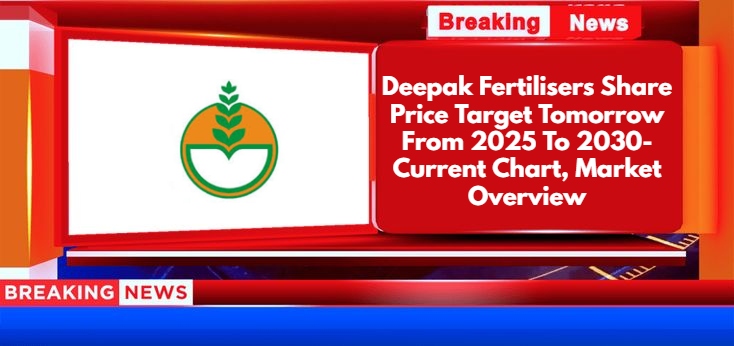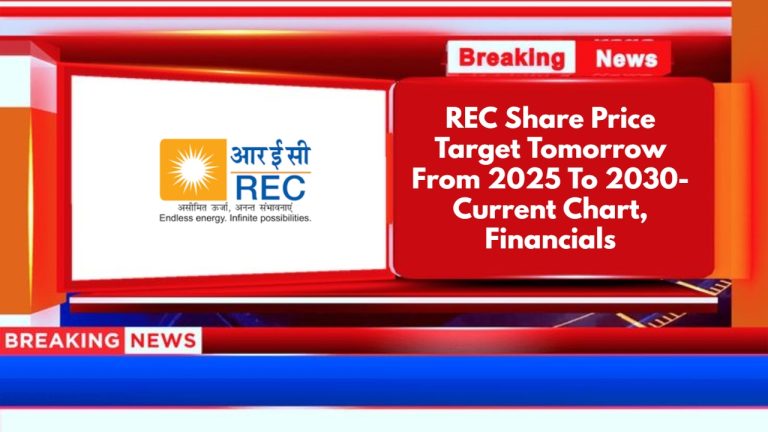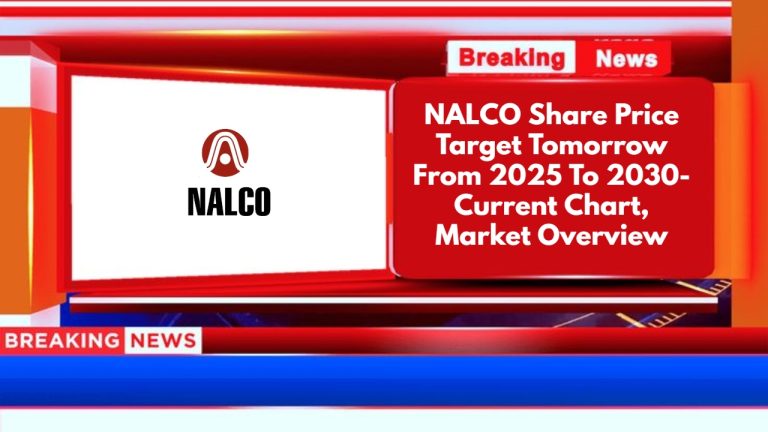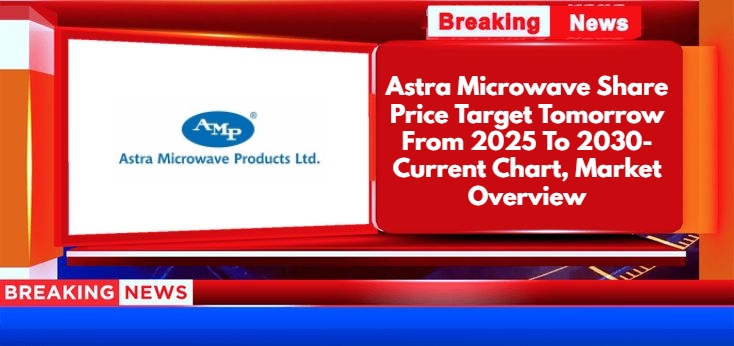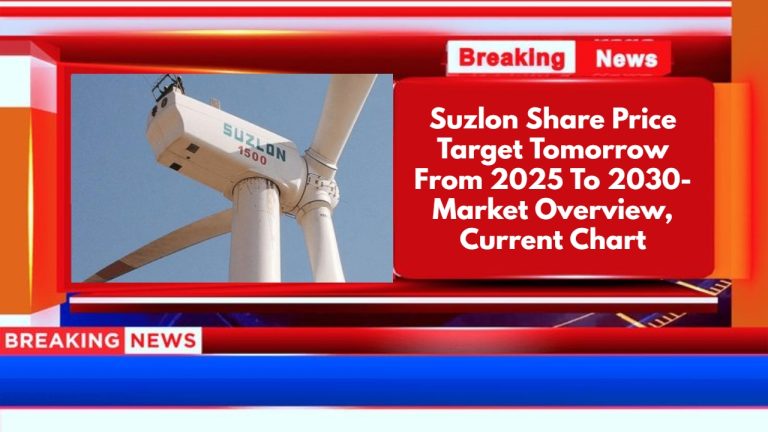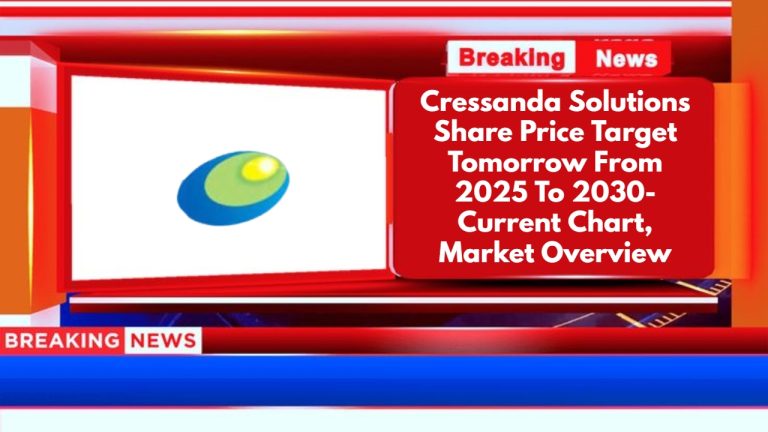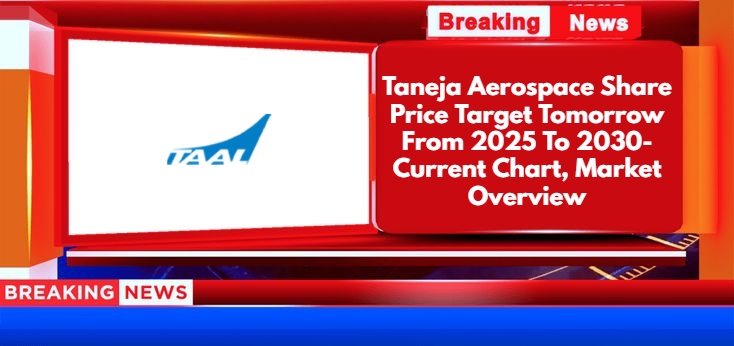Deepak Fertilisers Share Price Target Tomorrow From 2025 To 2030- Current Chart, Market Overview
Deepak Fertilisers is one of India’s leading chemical and fertiliser companies, trusted by farmers and industries alike. The company is well-known for offering high-quality fertilisers, industrial chemicals, and specialty products that help improve farm productivity and industrial efficiency. With a strong focus on innovation, safety, and customer satisfaction, Deepak Fertilisers continues to grow both in India and globally. Deepak Fertilisers Share Price on NSE as of 18 June 2025 is 1,558.00 INR. This article will provide more details on Deepak Fertilisers Share Price Target 2025, 2026 to 2030.
Deepak Frtlsrs and Ptrchmcls Corp Ltd: Company Info
- Headquarters: India
- Number of employees: 995 (2024)
- Revenue: 11,300 crores INR (US$1.4 billion, FY23)
- Subsidiaries: Mahadhan AgriTech Limited.
Deepak Fertilisers Share Price Chart
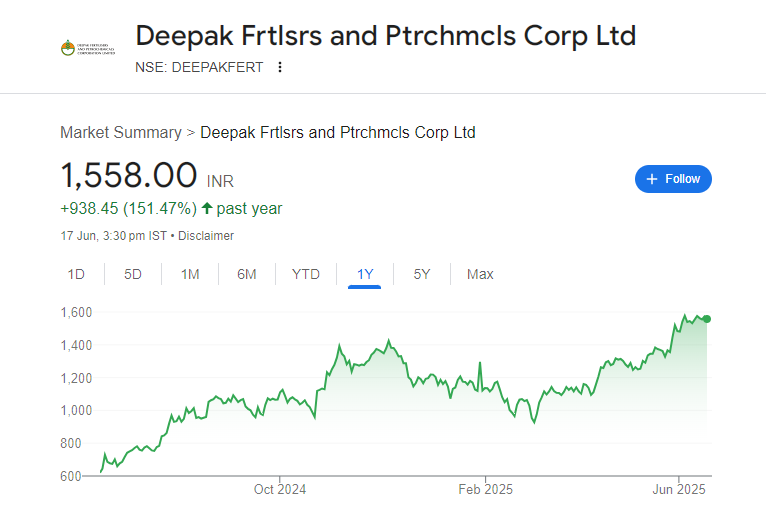
Deepak Fertilisers Share: Market Overview
- Open: 1,571.10
- High: 1,614.00
- Low: 1,552.00
- Mkt cap: 19.82KCr
- P/E ratio: 21.07
- Div yield: 0.64%
- 52-wk high: 1,637.00
- 52-wk low: 593.60
Deepak Fertilisers Share Price Target Tomorrow From 2025 To 2030
Here are the estimated share prices of Deepak Fertilisers for the upcoming years, based solely on market valuation, enterprise trends and professional predictions.
- 2025 – ₹1650
- 2026 – ₹2280
- 2027 – ₹2815
- 2028 – ₹3547
- 2029 – ₹4275
- 2030 – ₹5020
Deepak Fertilisers Share Price Target 2025
Deepak Fertilisers share price target 2025 Expected target could be between ₹1640 to ₹1650. Here are 7 key factors driving the growth of Deepak Fertilisers share price by 2025, written clearly and simply:
-
Booming Indian fertiliser demand
The Indian fertiliser market is expected to grow at a ~4.7% CAGR between 2023–2028, reaching around US$1.16 trillion by 2028—providing a solid backdrop for Deepak’s core business. -
Capacity expansion and capex investment
Deepak is investing ₹3,000–4,000 crore in a greenfield ammonia plant and new TAN facility, which will boost production and strengthen their supply chain. -
Strong focus on specialty products
With growing demand for specialty fertilisers (Smartek, Croptek, Bensulf) and a move from commodity to value-added products, Deepak is enhancing margins and customer stickiness. -
Backward integration into ammonia
The commissioning of the in‑house ammonia plant and long-term gas tie-ups (e.g., with Equinor from May 2026) reduce reliance on imports and stabilise feedstock costs. -
Diversified revenue streams
Besides fertilisers (43% of revenues), Deepak also benefits from industrial chemicals like nitric acid, IPA, and mining chemicals (TAN), offering resilience amid commodity cycles. -
Favourable commodity and input costs
Recent reductions in natural gas (–36%), MOP (–37%), and ammonia prices improved margins; a strong monsoon also lifts crop nutrition demand. -
Global expansion & strategic partnerships
Deepak is expanding internationally (Africa, SE Asia) with projected additional revenues of ₹500 crore by FY25, alongside collaborations (e.g., with Haifa Group) that promote specialty fertilisers.
Deepak Fertilisers Share Price Target 2030
Deepak Fertilisers share price target 2030 Expected target could be between ₹5000 to ₹5020. Here are 7 key risks and challenges that could impact Deepak Fertilisers’ share price outlook by 2030:
-
Raw Material Price Volatility
Deepak Fertilisers depends heavily on raw materials like natural gas and ammonia. Sharp increases in global gas or chemical prices could reduce profit margins, especially before full backward integration is achieved. -
Regulatory Uncertainty in Fertiliser Sector
Changes in government subsidy policies, environmental norms, or price controls can affect Deepak’s revenue and profitability, particularly in the fertiliser segment, which is highly regulated in India. -
Execution Risk in Expansion Projects
The company is investing heavily in new facilities (like the greenfield ammonia plant). Delays, cost overruns, or technical challenges in completing these projects could hurt future earnings and investor confidence. -
Commodity Price Cycles and Demand Fluctuations
The business is partially cyclical. Weak demand in industrial chemicals or mining explosives (TAN) during economic downturns or global slowdowns could lead to lower sales volumes. -
High Competition in Specialty Fertilisers
With more players entering the specialty fertiliser market, Deepak Fertilisers faces pressure to maintain its market share, pricing power, and customer loyalty in both domestic and global markets. -
Environmental and ESG Compliance Pressure
As environmental regulations tighten and ESG (Environmental, Social, Governance) standards rise, the company may need to invest more in cleaner technologies and sustainability measures, increasing operational costs. -
Currency and Geopolitical Risks
Since the company relies on imports for certain inputs and is expanding internationally, it is exposed to foreign exchange fluctuations, trade restrictions, and global geopolitical risks that can impact both costs and revenues.
Shareholding Pattern For Deepak Fertilisers Share
| Held By | May 2025 |
| Promoters | 45.63% |
| Flls | 10.74% |
| Dlls | 11.32% |
| Public | 32.31% |
Deepak Fertilisers Financials
| (INR) | 2025 | Y/Y change |
| Revenue | 102.74B | 18.42% |
| Operating expense | 20.83B | 25.46% |
| Net income | 9.34B | 110.98% |
| Net profit margin | 9.09 | 78.24% |
| Earnings per share | 73.95 | 110.98% |
| EBITDA | 19.25B | 51.73% |
| Effective tax rate | 20.57% | — |
Read Also:- Divis Lab Share Price Target Tomorrow From 2025 To 2030- Market Overview, Current Chart

